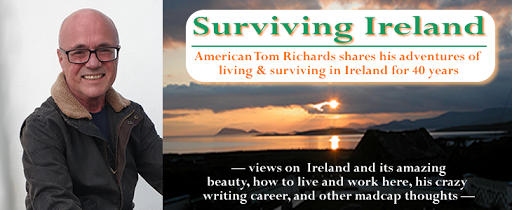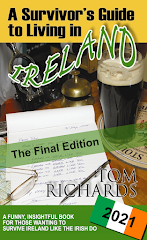
A couple of days ago, I received the following post:
Hello Tom. I have just had the pleasure of reading your book 'A Survivor's Guide to Living in Ireland' and also your updated online edition. My wife and I found your insight to be extremely helpful as we plan our big move to Ireland from Orlando, Florida at the end of December. What areas within commuting distance to Dublin would you suggest for a family with two small children (ages 3 years and 6 months)? All the best,
Mike Walton
Mike, and to answer your question, fortunately you and your family have any number of options. In the 1980s, when I first came to these green shores, such options frankly didn't exist. The area surrounding Dublin was, yes, composed of suburbs, but access to Dublin could be time consuming due to the relatively poor infrastructure (roads and the like), and the choice of housing for either purchase or rent/lease was limited. Depending on how long you think you're going to stay here, schools and/or nurseries are also going to be a consideration.
But the situation has drastically changed since those early days of my immigration: now we have such a choice! And due to the current economy, housing prices (both rental and purchase) have descended dramatically.
Infrastructure and the Economy
The wealth generated during the Celtic Tiger Years, as well as grants and loans from the EU, positively affected both Ireland's infrastructure and its choice of housing stock. It was simple economics: as the country's economy grew, the wealth of its people increased. As disposable income, savings, and anticipated future wealth grew, demand for housing - and the types of houses for sale - also grew. Additionally, the government as well as private companies and private/public companies, began to develop the road network. When I came here, 4 lane motorways were unheard of. Today, Ireland is criss-crossed by an ever-growing network of Motorways.
The M50 (a 4 lane motorway circling Dublin), the M1 (providing an artery to the North), the M3 (currently under construction, but an artery from Dublin, north to my town of Navan, and eventually to Kells and beyond), the M7 (toward Limerick), and the M8 to Cork represent billion euro investments that have improved the lives of Irish motorists to no end.
In the process, these arteries have opened up many Dublin 'suburbs'. It's simple location theory: make it easier and quicker to get to a place, and watch the houses (and house prices) sprout like mushrooms. And along with the houses will come the rest of the infrastructure: improved telephone services, broadband, more schools, shopping centres and malls, restaurants - and traffic! We have much more traffic today (due to increases in car ownership) than we ever had.
While the current economy will invariably stifle new infrastructure development for a number of years, it surely is one hell of a lot better than it used to be only 20 years ago.
A Choice of Neighbourhoods
See the Google Pic above, but good value in quality homes and apartments - either purchased, leased, or rented - exist North, West, and South of Dublin. All you have to do is figure out what's important to you, what needs must be met, what kind of lifestyle you and your family want, and how much you want to pay (for a complete list of homes and other properties currently on the market, go to
www.daft.ie. I am NOT an owner nor hold any interest in this website! So they owe me one...)
Do you want to live a life by the sea? Then to the South look at Bray or Greystones. Both are wonderful, smaller towns, only a few miles from Dublin (a friend of mine lives in Bray, and the M50 now makes it easier to get there). Both have fabulous seashores. To the North (just north of Swords on the map), try Skerries. That's a marvellous village: a small fishing town, boats nestle quietly at dock as you stroll along a seaside walk. The village itself is picturesque: a single main street, a few shops, pubs, and coffee bars, and wonderfully small estates of housing surrounding the entire village.
If you go further north, (north of Balbriggan - Baile Brigin), try Bettystown. Also along the coast, it's a wonderful small town.
Looking for something in the hills? Then again go south to County Wicklow. While much more expensive than other places, it offers exceptional housing, close communities, and wonderful walks through the hills.
Some of the places mentioned above are a bit 'remote' meaning that a shopping centre might be perhaps a half hour to an hour away. But all of these places offer the necessities: shops, schools, petrol stations, churches, pubs. And a welcoming people.
Okay, so suppose you would rather live in a larger town not too far away from Dublin, with closer access not only to the city but to local shopping centres and similar. Again, the choice is rather amazing, and depends on what you want.
Personally, and for my money, I'd look at County Cavan, and Virginia in particular. Again, it's a bit isolated - about 20 miles north of Navan (An Mhi on the map), and perhaps 35 miles from Blanchardstown Shopping Centre (Google Blanchardstown Shopping Centre - this has all the major shops), but this smaller town offers exceptional value for money, a lake, and much more. Bigger again? Then why not consider Navan? Good schools, easy access to Dublin, a shopping centre, the Boyne River, and a zillion pubs (or so it seems). Or perhaps Trim, about 8 miles down the road. This is a delightful town: the River Boyne meanders by Trim Castle (action scenes from Braveheart were filmed there a number of years ago); it has wonderful walks, good shopping, and a great choice of housing. Besides, a good friend of mine comes from there, so I'm biased.
Just north of Dublin is Lucan; again, a much larger, somewhat sprawling town that has seen exceptional growth. Or how about Maynooth, the home to National University of Maynooth? I'm once again biased because I lecture there. It's a wonderful little place: easy access to Dublin, lots of good housing and schools, leafy main streets, wonderful scholastic architecture, and a great Italian restaurant (I tried their ravioli only last week. Real Italian! The owners are from Rome!)
Go directly west from Dublin and you'll have all sorts of choices: Naas, Kill, Newbridge...the list goes on and on. Be a bit careful if you choose to go out this way. Some of the communities have been over-built, meaning empty housing, apartments and office blocks. Tallaght now has this problem, and it will take years to get back to something approaching supply/demand equilibrium.
I hope the above helps. The question you've asked makes me realise just how far this country has come in only a few short years. And it also makes me realise this: yes, right now the economy of this country is on its knees. But so it was in 1994. Then, this amazing miracle happened. I'm convinced that given the resilience of the Irish people, and with a little realistic political leadership, this miracle will recur.
Tom
(And Mike, thanks for the compliment about
A Survivor's Guide to Living in Ireland. Honest, folks. I didn't pay him a penny! Click on the link for more information.)










